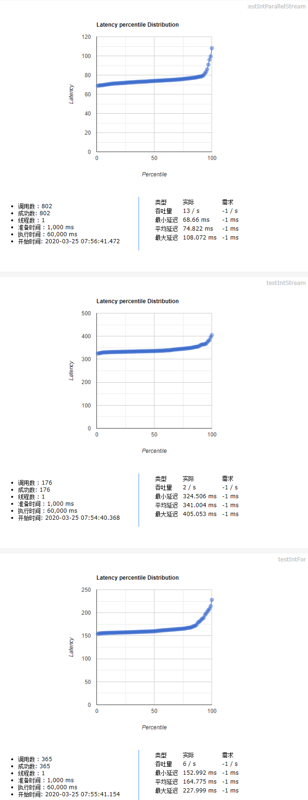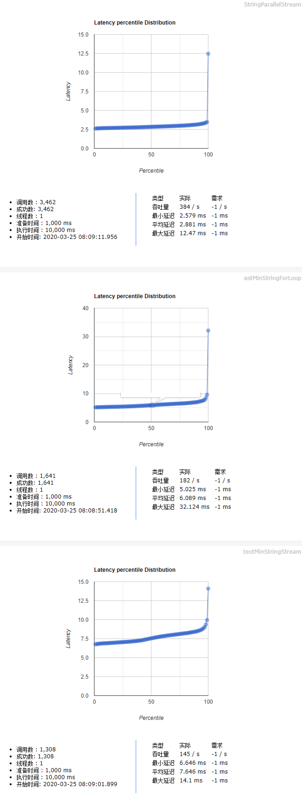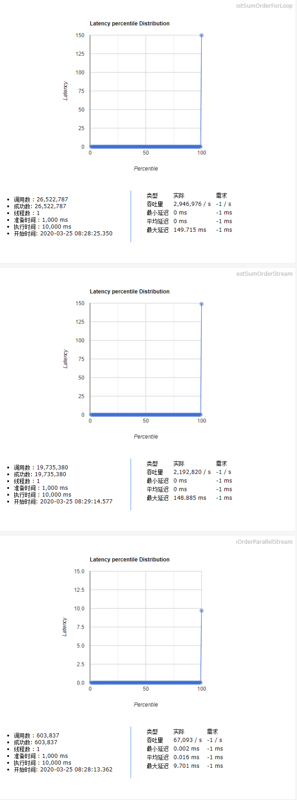恕我直言你可能真的不会java第6篇:Stream性能差?不要人云亦云
一、粉丝的反馈

问:stream比for循环慢5倍,用这个是为了啥?
答:互联网是一个新闻泛滥的时代,三人成虎,以假乱真的事情时候发生。作为一个技术开发者,要自己去动手去做,不要人云亦云。
的确,这位粉丝说的这篇文章我也看过,我就不贴地址了,也没必要给他带流量。怎么说呢?就是一个不懂得测试的、不入流开发工程师做的性能测试,给出了一个危言耸听的结论。
二、所有性能测试结论都是片面的
性能测试是必要的,但针对性能测试的结果,永远要持怀疑态度。为什么这么说?
- 性能测试脱离业务场景就是片面的性能测试。你能覆盖所有的业务场景么?
- 性能测试脱离硬件环境就是片面的性能测试。你能覆盖所有的硬件环境么?
- 性能测试脱离开发人员的知识面就是片面的性能测试。你能覆盖各种开发人员奇奇怪怪的代码么?
所以,我从来不相信网上的任何性能测试的文章。凡是我自己的从事的业务场景,我都要在接近生产环境的机器上自己测试一遍。 所有性能测试结论都是片面的,只有你生产环境下的运行结果才是真的。
三、动手测试Stream的性能
3.1.环境
windows10 、16G内存、i7-7700HQ 2.8HZ 、64位操作系统、JDK 1.8.0_171
3.2.测试用例与测试结论
我们在上一节,已经讲过:
- 针对不同的数据结构,Stream流的执行效率是不一样的
- 针对不同的数据源,Stream流的执行效率也是不一样的
所以记住笔者的话: 所有性能测试结论都是片面的 ,你要自己动手做,相信你自己的代码和你的环境下的测试!我的测试结果仅仅代表我自己的测试用例和测试数据结构!
3.2.1.测试用例一
测试用例:5亿个int随机数,求最小值
测试结论(测试代码见后文):
- 使用普通for循环,执行效率是Stream串行流的2倍。也就是说普通for循环性能更好。
- Stream并行流计算是普通for循环执行效率的4-5倍。
- Stream并行流计算 > 普通for循环 > Stream串行流计算

3.2.测试用例二
测试用例:长度为10的1000000随机字符串,求最小值
测试结论(测试代码见后文):
- 普通for循环执行效率与Stream串行流不相上下
- Stream并行流的执行效率远高于普通for循环
- Stream并行流计算 > 普通for循环 = Stream串行流计算

3.3.测试用例三
测试用例:10个用户,每人200个订单。按用户统计订单的总价。
测试结论(测试代码见后文):
- Stream并行流的执行效率远高于普通for循环
- Stream串行流的执行效率大于等于普通for循环
- Stream并行流计算 > Stream串行流计算 >= 普通for循环

四、最终测试结论
- 对于简单的数字(list-Int)遍历,普通for循环效率的确比Stream串行流执行效率高(1.5-2.5倍)。但是Stream流可以利用并行执行的方式发挥CPU的多核优势,因此并行流计算执行效率高于for循环。
- 对于list-Object类型的数据遍历,普通for循环和Stream串行流比也没有任何优势可言,更不用提Stream并行流计算。
虽然在不同的场景、不同的数据结构、不同的硬件环境下。Stream流与for循环性能测试结果差异较大,甚至发生逆转。 但是总体上而言 :
- Stream并行流计算 >> 普通for循环 ~= Stream串行流计算 (之所以用两个大于号,你细品)
- 数据容量越大,Stream流的执行效率越高。
- Stream并行流计算通常能够比较好的利用CPU的多核优势。CPU核心越多,Stream并行流计算效率越高。
stream比for循环慢5倍?也许吧,单核CPU、串行Stream的int类型数据遍历?我没试过这种场景,但是我知道这不是应用系统的核心场景。看了十几篇测试博文,和我的测试结果。我的结论是: 在大多数的核心业务场景下及常用数据结构下,Stream的执行效率比for循环更高。 毕竟我们的业务中通常是实实在在的实体对象,没事谁总对 List<Int> 类型进行遍历?谁的生产服务器是单核?。
五、测试代码
<dependency>
<groupId>com.github.houbb</groupId>
<artifactId>junitperf</artifactId>
<version>2.0.0</version>
</dependency>
测试用例一:
import com.github.houbb.junitperf.core.annotation.JunitPerfConfig;
import com.github.houbb.junitperf.core.report.impl.HtmlReporter;
import org.junit.jupiter.api.BeforeAll;
import java.util.Arrays;
import java.util.Random;
public class StreamIntTest {
public static int[] arr;
@BeforeAll
public static void init() {
arr = new int[500000000]; //5亿个随机Int
randomInt(arr);
}
@JunitPerfConfig( warmUp = 1000, reporter = {HtmlReporter.class})
public void testIntFor() {
minIntFor(arr);
}
@JunitPerfConfig( warmUp = 1000, reporter = {HtmlReporter.class})
public void testIntParallelStream() {
minIntParallelStream(arr);
}
@JunitPerfConfig( warmUp = 1000, reporter = {HtmlReporter.class})
public void testIntStream() {
minIntStream(arr);
}
private int minIntStream(int[] arr) {
return Arrays.stream(arr).min().getAsInt();
}
private int minIntParallelStream(int[] arr) {
return Arrays.stream(arr).parallel().min().getAsInt();
}
private int minIntFor(int[] arr) {
int min = Integer.MAX_VALUE;
for (int anArr : arr) {
if (anArr < min) {
min = anArr;
}
}
return min;
}
private static void randomInt(int[] arr) {
Random r = new Random();
for (int i = 0; i < arr.length; i++) {
arr[i] = r.nextInt();
}
}
}
测试用例二:
import com.github.houbb.junitperf.core.annotation.JunitPerfConfig;
import com.github.houbb.junitperf.core.report.impl.HtmlReporter;
import org.junit.jupiter.api.BeforeAll;
import java.util.ArrayList;
import java.util.Random;
public class StreamStringTest {
public static ArrayList<String> list;
@BeforeAll
public static void init() {
list = randomStringList(1000000);
}
@JunitPerfConfig(duration = 10000, warmUp = 1000, reporter = {HtmlReporter.class})
public void testMinStringForLoop(){
String minStr = null;
boolean first = true;
for(String str : list){
if(first){
first = false;
minStr = str;
}
if(minStr.compareTo(str)>0){
minStr = str;
}
}
}
@JunitPerfConfig(duration = 10000, warmUp = 1000, reporter = {HtmlReporter.class})
public void textMinStringStream(){
list.stream().min(String::compareTo).get();
}
@JunitPerfConfig(duration = 10000, warmUp = 1000, reporter = {HtmlReporter.class})
public void testMinStringParallelStream(){
list.stream().parallel().min(String::compareTo).get();
}
private static ArrayList<String> randomStringList(int listLength){
ArrayList<String> list = new ArrayList<>(listLength);
Random rand = new Random();
int strLength = 10;
StringBuilder buf = new StringBuilder(strLength);
for(int i=0; i<listLength; i++){
buf.delete(0, buf.length());
for(int j=0; j<strLength; j++){
buf.append((char)('a'+ rand.nextInt(26)));
}
list.add(buf.toString());
}
return list;
}
}
测试用例三:
import com.github.houbb.junitperf.core.annotation.JunitPerfConfig;
import com.github.houbb.junitperf.core.report.impl.HtmlReporter;
import org.junit.jupiter.api.BeforeAll;
import java.util.*;
import java.util.stream.Collectors;
public class StreamObjectTest {
public static List<Order> orders;
@BeforeAll
public static void init() {
orders = Order.genOrders(10);
}
@JunitPerfConfig(duration = 10000, warmUp = 1000, reporter = {HtmlReporter.class})
public void testSumOrderForLoop(){
Map<String, Double> map = new HashMap<>();
for(Order od : orders){
String userName = od.getUserName();
Double v;
if((v=map.get(userName)) != null){
map.put(userName, v+od.getPrice());
}else{
map.put(userName, od.getPrice());
}
}
}
@JunitPerfConfig(duration = 10000, warmUp = 1000, reporter = {HtmlReporter.class})
public void testSumOrderStream(){
orders.stream().collect(
Collectors.groupingBy(Order::getUserName,
Collectors.summingDouble(Order::getPrice)));
}
@JunitPerfConfig(duration = 10000, warmUp = 1000, reporter = {HtmlReporter.class})
public void testSumOrderParallelStream(){
orders.parallelStream().collect(
Collectors.groupingBy(Order::getUserName,
Collectors.summingDouble(Order::getPrice)));
}
}
class Order{
private String userName;
private double price;
private long timestamp;
public Order(String userName, double price, long timestamp) {
this.userName = userName;
this.price = price;
this.timestamp = timestamp;
}
public String getUserName() {
return userName;
}
public double getPrice() {
return price;
}
public long getTimestamp() {
return timestamp;
}
public static List<Order> genOrders(int listLength){
ArrayList<Order> list = new ArrayList<>(listLength);
Random rand = new Random();
int users = listLength/200;// 200 orders per user
users = users==0 ? listLength : users;
ArrayList<String> userNames = new ArrayList<>(users);
for(int i=0; i<users; i++){
userNames.add(UUID.randomUUID().toString());
}
for(int i=0; i<listLength; i++){
double price = rand.nextInt(1000);
String userName = userNames.get(rand.nextInt(users));
list.add(new Order(userName, price, System.nanoTime()));
}
return list;
}
@Override
public String toString(){
return userName + "::" + price;
}
}
欢迎关注我的博客,里面有很多精品合集
- 本文转载注明出处(必须带连接,不能只转文字): 字母哥博客 。
觉得对您有帮助的话,帮我点赞、分享!您的支持是我不竭的创作动力!。另外,笔者最近一段时间输出了如下的精品内容,期待您的关注。
- 《手摸手教你学Spring Boot2.0》
- 《Spring Security-JWT-OAuth2一本通》
- 《实战前后端分离RBAC权限管理系统》
- 《实战SpringCloud微服务从青铜到王者》
- 《VUE深入浅出系列》
- 本文标签: spring 互联网 GitHub value http 工程师 云 API DOM 统计 Spring Security rand https 管理 遍历 core Spring Boot stream git IDE HTML src id junit windows 数据 App build IO 微服务 测试 开发者 CTO 开发 Security ArrayList 服务器 UI 时间 操作系统 文章 HashMap java map 代码 list 博客 springcloud
- 版权声明: 本文为互联网转载文章,出处已在文章中说明(部分除外)。如果侵权,请联系本站长删除,谢谢。
- 本文海报: 生成海报一 生成海报二











![[HBLOG]公众号](https://www.liuhaihua.cn/img/qrcode_gzh.jpg)

